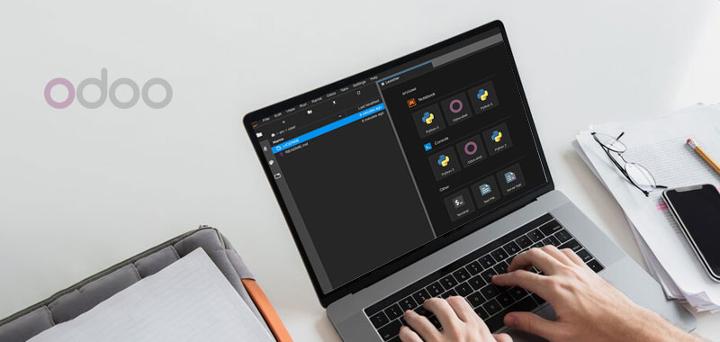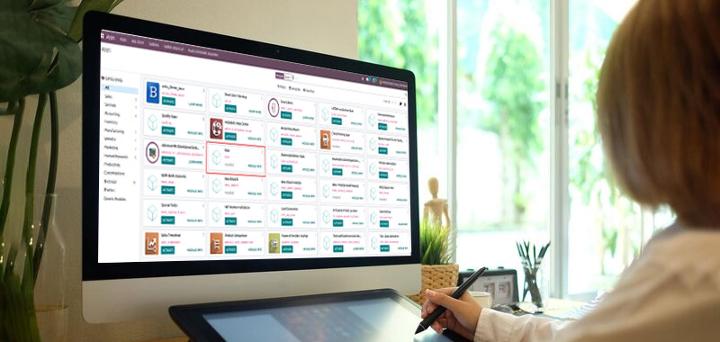Odoo Application Development
Odoo is an open- source enterprise resource planning software which is essential used to make the software according to the need and requirements of a specific business which perfectly aligns with the firm vision. This blog will guide us through the necessary steps to develop an application in Odoo, its importance, advantages etc.

Key Components of an Odoo Module
1.Models / python classes: these models which are usually represented as python classes are used to define the data structure and business aspect of any application.
2. Reports: Odoo has the feature to create customized reports with QWeb which is a primary templating engine in Odoo. It is also helpful in conducting basic operations like generation invoice, statements, etc.
3. View: It means how the data is displayed to the, the views module uses XML to display the data to the user/developer.
4. Controller: the controller is used to Handle all the user inputs and interacts with the model and directs the flow of data.
5. Security: It defines access to rules and regulations that a user logs on to see authorized data.

What are the applications offered by Odoo?
Odoo provides various application within the software which can be easily integrated, customized and automated by the Odoo developers here is a list of Odoo application in various modules to tackle different operations within the framework.
Apps to Increase Sales
1. Odoo-CRM
The Odoo-CRM also known as customer relationship management which is a customer-centric approach module that helps in lead tracking, business and sales tracking, activity planning like calls, meetings, mailing, quotes which enhance the overall processing.
2. Odoo-Point-of-Sale
The Odoo-Point of Sale can be operated on web browsers, various devices like mobile, laptop, etc. and is used for stocks automation you get quick and real-time statistics with integrated data across the workflow.
3. Odoo-Sales
Odoo-sales is the application used to smoothen out the sales process. This application involves a 360-degree approach from working on the quotation to sales order with delivery and invoice functions. The app also involves processing like Sending Quotations to the clients, providing suitable Invoicing Method, etc.
4. Odoo-Project-Management
This functions serve the Odoo applications by monitoring the interface which allows the firm to schedule the tasks and plan the further workload.
5. Odoo-Timesheet
Odoo-Timesheet application helps the user to track the activities of the employees which ensures a seamless profitability of projects and invoice functions. It also combines with other modules to provide maximum work efficiency.
6. Odoo-Helpdesk
The Odoo-Helpdesk works on three principles Track, prioritize, and solve customer tickets to boost the organization growth.
Apps to Enhance Operations
1. Odoo-Stock-Inventory
The Odoo-stock Inventory application helps the business to boost the sales with warehouse organization, setting up automated functions and tracking inventory movements
2. Odoo-MRP
The Odoo MRP application is used to display the product requirements, its manufacturing times, planning and other suitable alert set-up.
3. Odoo-Purchase
Odoo Purchase improves the tracking of purchase agreements, quotations, and purchase orders. And monitors the upcoming purchase tender. With this application the user can easily manage suppliers and purchase orders.
Odoo Apps to Build Websites
1. Odoo-Website-Builder
The ERP software Odoo gives access to build websites Odoo CRM function with its ability to drag and drop.
2. Odoo-eCommerce
The user can easily operate their online store through Odoo e-commerce application also Odoo offers facilities like stocks, invoices, sales, billing, etc. within the module and can be integrated with various other e-commerce platforms.
Apps to manage your finance
1. Odoo-Invoicing
Odoo Invoicing is a standalone method to tackle the processes like invoices, customers data segregation, and managing multiple payments within an organization.
2. Odoo-Accounting
Odoo's accounting application which gives the user the liberty to maintain accounts, finance, generate invoice, track the expense and maintain the payroll system and much more. Also, the software has a more comprehensive range of features to offer which can be customized according to the client’s needs and requirement.
Apps to expand marketing actions
1. Odoo-Mass-Email Marketing
Odoo's gives an option for email marketing which helps the user to create, send and track emails with an easy-to-use interface, accurate segmentation of recipients this application benefits a firm to reduce the time and error while maintaining the promotion process.
2. Odoo-Marketing Automation
It is another automation marketing integration present in Odoo which allows the user to create automatic campaigns, customer pathways, email promoting, etc.

Steps to Develop an Odoo App
Step 1: The first step involves setting up the development environment:
Odoo installation: Odoo is a cloud-based software and can be accessed easily as online, in a cloud server, or even on-premise server which depends on the user need. Just you need to follow the proper guide given on Odoo website
Create a New Database: Once the user is done with Odoo installation, creating a new database or record for your app development is important to seamless workflow.
Access the Odoo Backend: Log in to the Odoo backend (the function of Odoo which handles logic, data processing, and other data backend work) using your authorization.
Step 2: involves creating a New Module
This steps includes defining and giving modular Structure which means Creating a new folder for your required module within the Odoo additional folders. Also creating a python classes is required in this step for example a food business is creating it they must add python classes for menu, sales, invoice etc.
Step 3: Creating Views
This is what a user sees on their customized software as views and adding menu options comes under this step, which is further used in functions like data entry, listing records with the help of XML programming language
Step 4: Giving correct Implementing for Business Logic
The step can be different for different business modules as it incorporates Implementation of any necessary business logic in your models. Which can be adding property values, calculation based on areas for a real estate business for simply managing HR functions for a beauty brand.
Step 5: Examine your app
After a successful installation of your module from the Odoo backend the user needs to check it from the "Update Apps List," and put it to test if the user still faces issues like bugging, they even use build-in- debugging tools to avoid the same.
Conclusion
In conclusion, Odoo application development is a key element which helps the business to run a smooth and automated workflow also choosing a right Odoo application developer is another crucial process that contributes to enhancing operational efficiency and aligning with organizational goals.
Frequently Asked Questions
1. What is Odoo-eCommerce?
Odoo-eCommerce is a user-friendly application that helps the user to operate their online store through Odoo e-commerce application also Odoo offers facilities like stocks, invoices, sales, billing, etc. within the module and can be integrated with various other e-commerce platforms.
2. What are the Key Components of an Odoo Module?
Models / python classes: these models which are usually represented as python classes are used to define the data structure and business aspect of any application.
Reports: Odoo has the feature to create customized reports with QWeb which is a primary templating engine in Odoo. It is also helpful in conducting basic operations like generation invoice, statements, etc.
View: It means how the data is displayed to the, the views module uses XML to display the data to the user/developer.
Controller: the controller is used to Handle all the user inputs and interacts with the model and directs the flow of data.
Security: It defines access to rules and regulations that a user logs on to see authorized data.
3. What is the role of an Odoo e-commerce website developer?
Developing and customizing the software: developers are skilled professionals who are well versed with the programming language python which helps them to develop and customize the software, integrate the data to meet client requirements. The developer has the role to implement and integrate the data as per the client requirements.
Module integration: the developer combines various modules such as HR, accounting, sales, supply chain, studio, etc. developers must integrate common words combine the new functions with the existing ones to make sure a seamless, interconnected system aligning with the organization.
Database management: The database management is an essential task to plan the data migration and integration of the data structure ensuring no data loose and breaching. There are different modules made by the developer to eliminate the chance of error and decrease manual workload.
User interface/ user experience (UI/UX design): It comes up as a responsibility where the e-commerce website developers work in improving the interface of the software to enhance accessibility and efficiency.
4. What is Odoo accounting?
The first one in the list must be Odoo ERP software which gives the user the liberty to maintain accounts, finance, generate invoice, track the expense and maintain the payroll system and much more. Also, the software has a more comprehensive range of features to offer which can be customized according to the client’s needs and requirement. Odoo Accounting is an open source, versatile accounting software that comes under Odoo free community version which helps business to conduct accounting features and develop modules accordingly.
5. What are the Odoo Apps that helps in enhancing operations?
Odoo-stock Inventory: The Odoo-stock Inventory application helps the business to boost the sales with warehouse organization, setting up automated functions and tracking inventory movements.
Odoo-MRP: The Odoo MRP application is used to display the product requirements, its manufacturing times, planning and other suitable alert set-up.
Odoo-Purchase: Odoo Purchase improves the tracking of purchase agreements, quotations, and purchase orders. And monitors the upcoming purchase tender. With this application the user can easily manage suppliers and purchase orders.
6. What is Odoo-CRM?
The Odoo CRM also known as customer relationship management which is a customer-centric approach module that helps in lead tracking, business and sales tracking, activity planning like calls, meetings, mailing, quotes which enhance the overall processing.
Read More:
What Programming Language is used in Odoo?